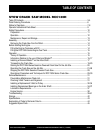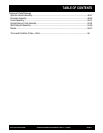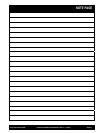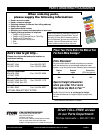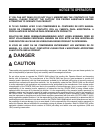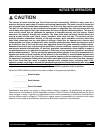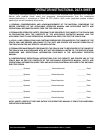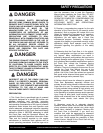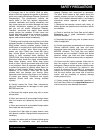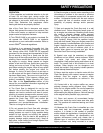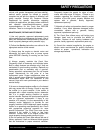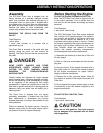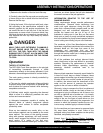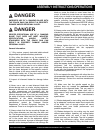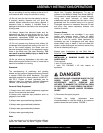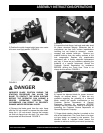
RCC130H-CRACK SAW OPERATION AND PARTS MANUAL REV #1 (11/18/04) PAGE 11
SAFETY PRECAUTIONS
6) Prolonged use of the CRACK SAW (or other,
similar machines) exposes the operator to vibrations
which may produce Whitefinger Disease (Raynaud's
Phenomenon). This phenomenon reduces the
hand's ability to feel and regulate temperature,
produces numbness and burning sensations and
may cause nerve and circulation damage and tissue
necrosis. Antivibration systems do not guarantee
that you will not sustain Whitefinger Disease.
Therefore, continuous and regular users should
closely monitor the condition of their hands and
fingers. After each period of use, exercise to restore
normal blood circulation. If any of the symptoms
appear, seek medical advice immediately.
7) Clothing must be sturdy and snug fitting, but allow
complete freedom of movement. Never wear loose
fitting jackets, scarves, neckties, jewelry, flared or
cuffed pants or anything that could become caught
on controls or moving parts. Wear long pants to
protect your legs. Protect your hands with heavy
duty, nonslip gloves to improve your grip. Good
footing is most important when operating the
CRACK SAW. Wear sturdy boots with nonslip soles.
Steel-toed safety shoes are highly recommended.
Keep shoes properly laced. Never wear tennis
shoes or other, similar type shoes which afford little
or no protection. Wear an approved safety hard hat
to protect the operator'(s') head(s) where there is a
danger of head injuries. Noise, generated by the
operation of the CRACK SAW and the actual
process itself, can damage your hearing. Wear
approved sound barriers (ear plugs or ear mufflers)
to protect your hearing. Continuous and regular
operators should have their hearing checked
regularly.
8) Visually inspect the Crack Saw, components,
tools and accessories for damaged or worn parts.
BEFORE each use:
a) Disconnect the engine spark plug wire or power
source cable.
b) Clean and remove all accumulated foreign matter
from the wheels and determine that each rotates
freely.
c) Clean and remove all accumulated foreign matter
from inside the main frame area.
d) Inspect the V-belt drive for proper tension, wear
and general condition. Replace each component as
necessary.
e) Inspect the arbor shaft and diamond blade guard
assemblies for excessive wear and structural
integrity. Replace each component as necessary.
The arbor shaft rotates at high speed during the
specific process and can be subject to high wear
rates if the installed diamond blade is not properly
maintained and/or replaced at regular service
intervals.
f) Determine that operator controls work freely, all
safety devices are operative and information decals
are readable.
g) Check to see that the Crack Saw and all related
accessories are in good, mechanical condition
BEFORE utilization.
h) Reconnect the spark plug wire or power source
cable as applicable
9) Contact appropriate representatives to determine
if/where electrical cables, gas lines and other
hazardous items are buried under the work surface
BEFORE utilization. The Crack Saw and related
accessories are not insulated. Contact with buried
electrical cables, gas lines and other hazardous
items can result in electrocution and/or an explosion.
10) Know how the controls operate. Know how to
stop the engine or electrical motor quickly in an
emergency. Always start the engine or electric motor
according to the instructions as outlined in this
manual to minimize the possibility of unexpected
contact with the work surface. Unexpected contact
with the work surface can cause loss of machine
control, and the possibility of property damage
and/or personal injury.
11) Never exceed the recommended capacities of
the Crack Saw. Refer to the Specifications section
of this manual for more detailed information.



